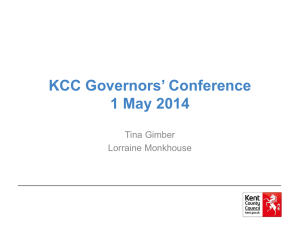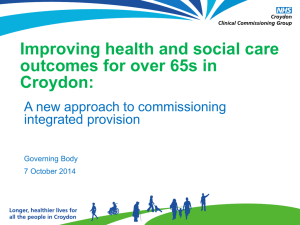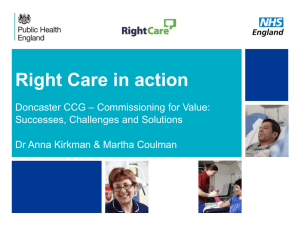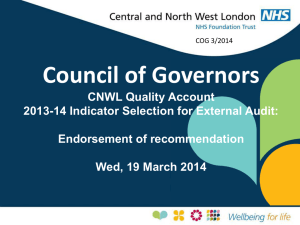Mark Redhead NHS Policy Update
advertisement
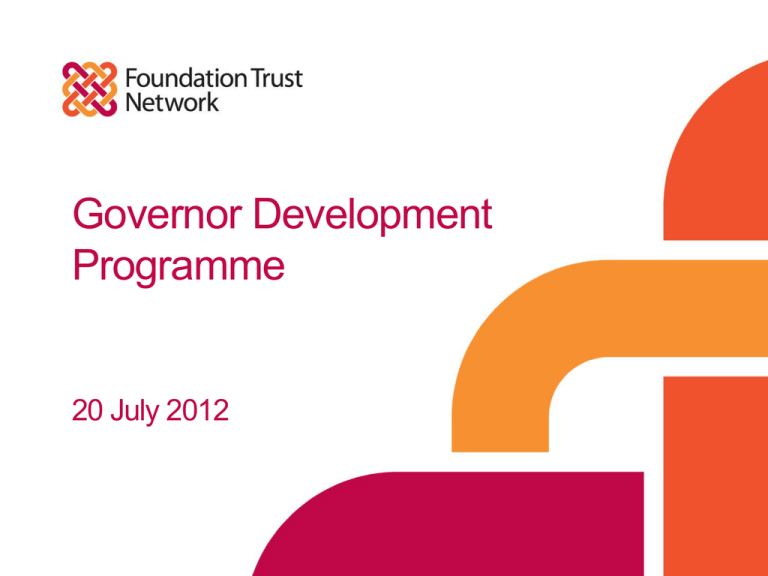
Governor Development Programme 20 July 2012 FTN Policy Update 20 July 2012 Governors Development Programme - Cambridge Mark Redhead Head of Policy Context - opportunities and challenges • Finances • Quality • The Francis inquiry • Health and Social Care Act • Integration and service transformation • Workforce, education and training Finances • Nicholson Challenge - £20bn by 2015 • Revised now to £50bn by 2020 – at least 2% p.a. for next decade • Cost improvement and sustainability – 5.7% • Monitor assumptions – living the downside Finances 2 • Many current financial problems are systemic • Has not been a clear national story/ leadership around the need to change the NHS and moving services out of hospitals • NHS sustainability linked with social care future funding solution • South London Healthcare Trust in administration – test of appetite Finances 3 • Tariff levers and providers being loaded with risk • 30% for non-elective admissions over 2008-9 levels • No reimbursement for readmissions within 30 days – though some progress here. • Supposed commissioner investment in service change - where has the money gone? • Contract penalties, for example on C Diff add to risk – how enforceable are these fines? • Demand management – non-elective continues to rise Can The Pattern Of Increased Demand Be Halted? Emergency admissions increased 11.8% between 2004 -9, with a large increase in short stay admissions. Quality • Maintaining quality improvement alongside finances • Role of FT Boards and commissioners • Dialogue with patients, members, governors – bespoke measures • CQC role • Patient safety and service re-design: political barriers • Mid-staffs, Francis, how to achieve an open learning culture • FTN work on quality landscape Quality - regulation of the system • Market entry standards vs. performance improvement • CQC leadership agrees Boards drive quality • Thought leadership – first CQC market report out now, focus on maternity • judges non-compliance against standards – getting a rounded view? • proportionate judgements • consistency Francis report into Mid-Staffordshire NHS FT • Expected October • Possible focus on regulatory rather than cultural solutions? E.g. regulation of managers, prescribed staffing ratios • Regulation on top of proposed regulatory landscape could paralyse the service • Response around learning cultures? Health and Social Care Act • Need to make sense of what has emerged – an implementation challenge on an unprecedented scale. • Six months to get the building blocks and the rules right in the secondary regulations • But behaviours also important - Provider-commissioner relationships critical to bring about the necessary system solutions Health and Social Care Act – key functions • Commissioning • Provision • Regulation • Integration …..simple? System Infrastructure in new NHS – key actors • • • • • • • • • SoS accountable to Parliament through outcomes framework (COF) NICE: Standards Setting informing the COF National Commissioning Board/CCGs Health and Well Being boards Quality Regulator (CQC) Foundation Trust Regulator (Monitor Mark 1) Sector Regulator (Monitor Mark 2) Health Education England (Education and Training System) Plurality of providers – but FTs clearly the dominant type and a source of system stability in the transition Commissioning • NICE: sets standards that commissioners can use • NHS Commissioning Board - Responsible for delivering the outcomes framework - Sets incentives for tariff pricing (i.e. the currencies) - Authorises, supports and oversees CCGs - power devolved against authorisation framework, in waves - Commissions at national level • Clinical Commissioning Groups - commission local services - drives quality through contracts with national core Commissioning issues • Commissioners need a sophisticated understanding of local service dependencies to avoid unintended de-stabilisation of providers • Will they support necessary service reconfiguration? • Challenge of commissioning for outcomes across the system – acceptance of risk, innovation and new partnerships • Need for longer term contracts to enable integration and alignment of funding models/incentives with primary and social care • Clarity on managing conflicts of interest Health and wellbeing boards: integration • A process of designing, integrating and commissioning services across localities • Not just meetings of a Board. • Membership: who has money to spend? • Expected to be small • Engagement with providers important – opportunity for FTs to deliver on integration through collaborative leadership • Designed around work streams – e.g. childrens’ services, later life services NHS Foundation Trust freedoms • Private Patient Income Cap lifted from 1 October 2012 Principal purpose test so that non-NHS income limited to 49%: no more than 5% increase in any one year without governor consent; intentions included in forward plans though commercially sensitive information exempt. • Other changes come in from April 2013 • Open Board meetings • Limits on borrowing are removed • New powers for governors /……. Part 4 of the act, the board and governors • ‘The general duty of the board of directors, and of each director individually, is to act with a view to promoting the success of the corporation so as to maximise the benefits for the members of the corporation as a whole and for the public.’ • ‘The general duties of the council of governors are: • to hold the non-executive directors individually and collectively to account for the performance of the board of directors, and • to represent the interests of the members of the corporation as a whole and the interests of the public.’ The governor role • Appoint/remove Chair and NEDs. • Chair/NED remuneration. • Approve/not approve appointment of CE. • Appoint/remove auditor. • Receive annual accounts, annual report and any auditors report. The governor role - additions in 2012 Act • Hold the NEDs to account. • Represent the interests of members and the public. • Approve/not approve mergers, acquisitions and significant transactions. • Consider impact of non-NHS derived income on NHS work. • Approve/not approve proposed increases of non-NHS income of more than 5% of income. • Jointly approve constitutional changes with the board. What else? • New power for governors to require one or more directors to attend a meeting to answer questions. • Governors to receive board agendas before the meeting and minutes a.s.a.p. after the meeting. • Explicit legal duty for directors to avoid conflicts of interest. • Duty on the FT to equip governors with the skills they need to do their job. • Panel to advise governors. • De-authorisation to disappear. • Minor changes to annual reporting regime. • Failure regime. An increasingly autonomous all-FT public provider sector • NHS Trust Development Authority to manage the FT pipeline • Continuing Monitor oversight of foundation trusts until at least 2016, through additional license conditions – fair? • Sector needs to develop tests for exiting the regime – risk of “Authorisation +”? Need a future PDC Steward to be designed now. Regulation, Monitor and the provider license • Monitor responsible for sustainability of services, along with commissioners – how Monitor and commissioners inter-act will be critical • Competition, integration and the patient interest • Monitor consultations open now on the level playing field and approach to costings – new information burden on providers • Protection of services – proposed restrictions on provider activity and system of risk pools – what of the provider freedom to innovate and succeed? Workforce, education and training • Provider leadership on education, training and workforce • Unique opportunity for employer driven workforce agenda • Need quick wins, senior provider engagement and flexibility across the whole workforce • Focus on LETB development and the right relationships with HEE nationally – FTN supporting LETB leads The next year • A time for making sense of the new environment • Much still in flux • Finance and quality remain the biggest operational challenges • But the shape of the license will be of enormous importance • What will commissioners do? • How much will the new system support providers and give them room for manoeuvre? • Workforce is a big opportunity – need early signs of change • The Francis inquiry report – yet more regulation? Beyond next year - longer term strategic issues • Incentive alignment across local health economies • Commissioning maturity and shared solutions • Delivering on a cost-effective quality workforce • The innovation agenda • Securing greater FT autonomy, protecting the taxpayer interest • Achieving an all-FT provider sector How the Act might affect my governor role: Sharing ideas Kim Hutchings Head of Development and Engagement A reminder ... • • • • • • • • Hold the board of directors to account for the performance of the trust via the NEDs Represent the interests of members and the public Approve entering into any kind of significant transaction Approve any application by the trust to enter into a merger, acquisition, separation or dissolution Approve any increase of 5% or more in private patient income Approve amendments to the constitution Require one or more directors to attend a meeting for the purpose of obtaining information about the Trust’s or directors’ performance Receive Board of Directors meeting agendas before and minutes after Board meetings Finally… • The trust must take steps to ensure that governors are equipped with the skills and knowledge they require to undertake their role. New national training programme for governors • Department of Health initiative • Four distinct packages: • General awareness/pre-induction training to help members make an informed decision on applying to become a governor • Governor induction to support locally provided training from the host FT • Core skills including finance, strategy, quality • Specialist skills eg. legal, audit, remuneration responsibilities Lunch Just outside the main room. Workshop 1: NED appointments – Study centre 2 Accountability in action – Main room Understanding finance & business – Study centre 8 Workshop 1: NED appointments – Study centre 2 Effective questioning and challenge – Main room Representing member views – Study centre 8


